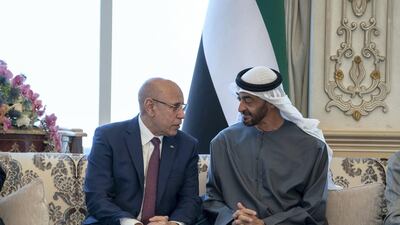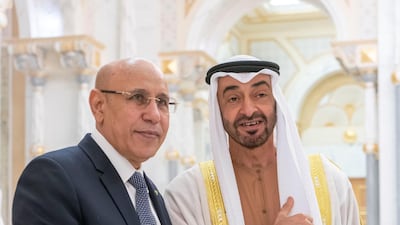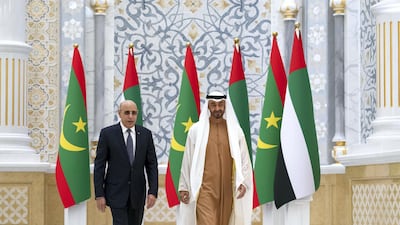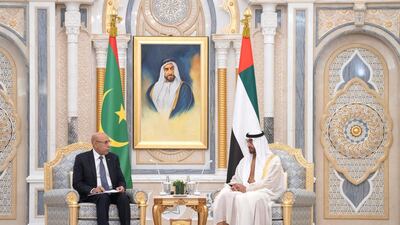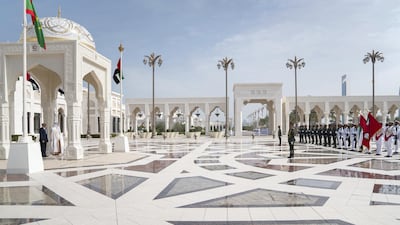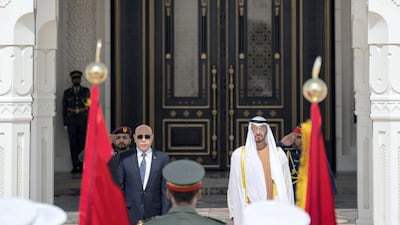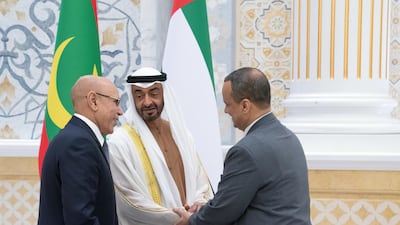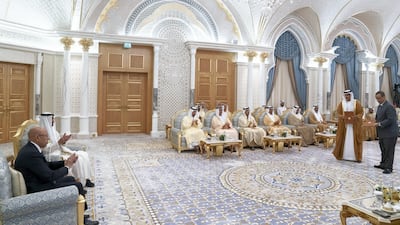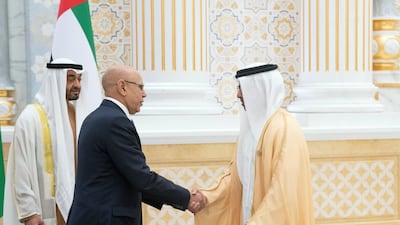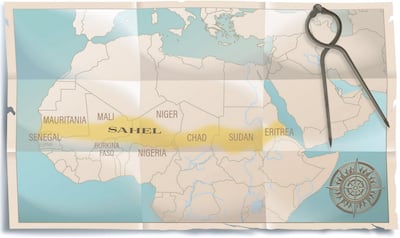Last week, as Mauritania's President Mohamed Ould Ghazouani visited Abu Dhabi, the UAE announced the allocation of $2 billion to the country towards investment and development projects. Although the news barely attracted international coverage, for Mauritania this was a colossal leap forward: the country's GDP is estimated at $5bn, meaning that the UAE plan represents no less than 40 per cent of its economy. Abu Dhabi's decision is a clear indicator that it sees Mauritania as a key partner in the sub-Saharan region, a move that is driven by both strategic and economic considerations. It is borne out of the Emirati belief that stability relies on economic development rooted in secure communities.
Over the past few years, Mauritania has been an anchor of stability in sub-Sahara. The country has not suffered from attacks conducted by Islamist militants but the regional trends are troublesome: terrorist organisations, initially contained in northern Mali, have moved to the centre of sub-Sahara and intensified their operations, specifically in the area of the so-called “Three Borders” between Mali, Niger and Burkina Faso.
In late 2018, the headquarters of the G5 Sahel Joint Force – the military command of the regional organisation – had to be relocated from Malian city of Sevare to the capital Bamako following a deadly attack of Jamaat Nusrat Al Islam Wal Muslimeen, a local merger between Al Qaeda and Ansar Din. Today, there are fears among observers in Mauritania that Mali and Burkina Faso might not stand long against the war of attrition waged by the extremists. This is why France announced last week a surge of 600 additional troops putting the total number of its military personnel deployed in sub-Sahara above 5,000. The hard truth is that the stabilisation process that started after the 2013 intervention in Mali has now been superseded by an unexpected return to the initial war-fighting mode, but bigger in its intensity and wider in its scope.
The stability of the sub-Saharan region is a critical issue for the international community: extremist movements such as ISIS are progressively migrating from the Syrian and Iraqi battlegrounds to northern Africa and sub-Sahara where they find ungoverned spaces to regroup. The UAE already understood the stakes behind this evolving situation back in late 2017 when it pledged $30 million to the G5 Joint Force.
Today, whereas the trajectory of the G5 is uncertain, Mauritania remains a credible security partner. For more than two decades, Mauritanian forces have made counterterrorism their top priority. This led the country to join Nato’s Mediterranean Dialogue and the US Pan-Sahel Initiative in 2002 (later renamed the Trans-Saharan Counterterrorism Initiative).
All along this process, Mauritanian armed forces have put an emphasis on the education and training of its troops. As a Nato partner, it regularly sends its officers to the Nato School in Germany and the Nato Defence College in Italy. In 2016, Mauritania built a military campus, next to Nouakchott University, delivering strategic courses to build the skills of its future military leaders. The construction of this campus was made possible thanks to a financial aid from Abu Dhabi and, as a show of gratitude, the campus was named Mohamed bin Zayed Defence College.
More broadly, Mauritanian authorities share similar views to Abu Dhabi with regard to extremist organisations. An example of this is Mauritania's modest contribution to the war in Yemen, where about 500 of its soldiers had been deployed.
However, it is important to note that the Emirati aid package goes beyond a military-centric approach. The growth of extremist organisations in sub-Sahara is driven not only by global terrorist trends but by local dynamics as well. The recruitment of militants derives from regional underdevelopment and feelings of disenfranchisement among minority communities. Therefore, the most effective response to the extremist phenomenon will eventually be economic and social, rather than military. This is why overall supporting the development of Mauritania matters.
Although the Mauritanian economy is modest, its indicators are promising. For the visitor travelling from the UAE, the capital of Nouakchott and its few low-rise white buildings standing between the desert and the Atlantic Coast might remind old vignettes of Abu Dhabi that seem taken from Mohammed Al Fahim's From Rags to Riches.
Today, Mauritania relies on natural resources such as iron ore and gold. Other fields such as agriculture and the telecom are slowly growing but most importantly, gas reserves discovered last year trigger major expectations: according to western companies involved in the ongoing exploration of the gas field, its reserves could be bigger than the Zohr gas field discovered in 2015 in Egypt. Under these circumstances, the Emirati package will support the ongoing reform plans of Mr Ghazouani.
President Ghazouani was elected last year in the first peaceful transition of Mauritania's history. Although a former chief of defence, he had run a campaign primarily focused on economic development and social justice. In fact, one of his first decisions since coming to power was to fight against the traffic of counterfeit medications inside the country, a measure that was widely praised by Mauritanians.
Since then, Mr Ghazouani launched an initiative branded “The Priorities”. Amounting $1bn, this project involves modernisation programmes. It includes the construction of road systems and schools across the country as well as ports and airports. Meanwhile at the social level, the new policy aims to create a proper welfare system through incentive measures for youth employment and the distribution of allowances for low-income families.
Therefore, the newly announced UAE allocation to Mauritania has to be understood in its regional context: it signals the intention of Abu Dhabi to contribute to the stabilisation of sub-Sahara, not only through reactive security measures but through long-term development-driven investments.
Jean-Loup Samaan is associate professor in strategic studies with the UAE National Defence College. The views expressed in this article do not necessarily reflect those of the UAE National Defence College, the Near East South Asia Centre for Strategic Studies, nor any government.
